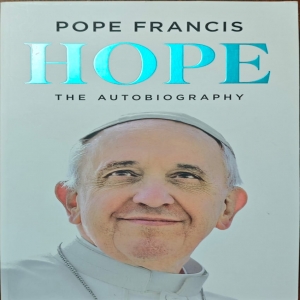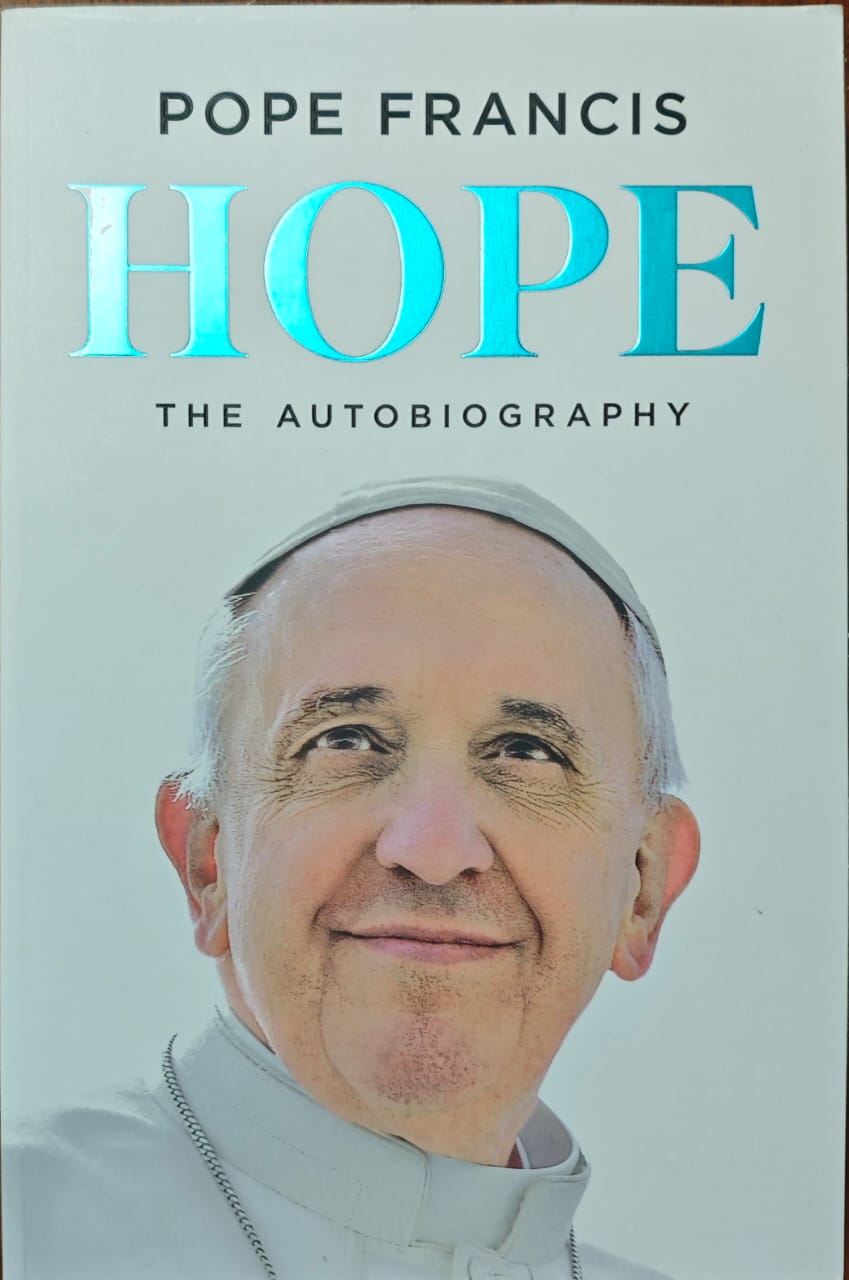
 A. J. Philip
A. J. Philip

When I read about Pope Francis' autobiography "Hope," co-authored with Carlo Musso in Italian and translated into English by Richard Dixon, I decided to get a copy. Amazon said it would be available only from January 30. So, it was a pleasant surprise to find a carton containing the book being opened at the DC Bookstall at the Kerala Literature Festival on the seafront in Kozhikode on January 23. Since they had not entered the book details in their inventory, I had to wait till they did. The icing on the cake was that I became the first buyer of "Hope."
I had many reasons to buy the book. Pope Francis is a person I respect for many of his qualities of heart, if not head. Also, it was the first autobiography written by a Pope while still holding office. As the book jacket says, Pope Francis wanted the book published only after his death. He does not give a very convincing reason why he broke that decision and published it now.
I had a friend, D Vijayamohan, who was authorised to write the biography of Swami Ranganathananda, the first Malayali monk to head the Ramakrishna Mission. When he presented the manuscript for Swami's approval, he just touched it and returned it to him. Of course, the author was told that Ashram rules prohibited the publication of a Swami's biography while alive. In other words, Vijayamohan would only be able to publish it posthumously. Given a choice, he would see the Swami alive rather than publish the book.
Pope John Paul II was the only Pope I could shake hands with, and I admired him for giving purposive leadership to the Church and, in the process, pulling down the Iron Curtain that divided Europe and much of the world. I had another reason to read his Bible-sized authorised biography "Witness to Hope," written by George Weigel, whom I interviewed at his office in Washington. I have read several biographies, but this one stands out for the author's magisterial approach that left nothing to the imagination.
I respected Pope Benedict XVI for his doctrinal qualities, which made him one of the greatest defenders of the faith, especially Catholicism. I had read his encyclicals and knew that he could have earned a lasting name as a theologian, if not a Pope. When his "Last Testament: In His Own Words," in the form of interviews granted to Peter Seewald, appeared, I bought a copy immediately and read it. The book was published soon after his resignation, and I wanted to know why he quit when the job was for life.
While I knew Pope Francis was the first Pope from Latin America and was Argentinian, I did not know that his grandparents migrated to the New World from Genoa, Italy, for reasons that included fear of fascists. In his prologue, he describes how a passenger ship sank into the depths of the Atlantic, drowning 300, including the captain. Known as the Titanic of Italy, he had a reason to narrate it.
His paternal grandparents and their only son, to whom the future Pope was born, were planning to travel by the same ship. Fortunately for them, his grandfather could not sell his properties in Italy in time, delaying his departure and thus preventing them from boarding the ill-fated ship. Argentina was then attracting immigrants from Europe, who tried to maintain their identity. Like Indians, especially Malayalis, who keep visiting their ancestral place even after settling in foreign lands, Italians would return to their land, spend all their savings, and return to Argentina barehanded.
Autobiographies are interesting when the writers are interesting, not necessarily for their piety but for being, say, the wife of Donald Trump or being Prince Harry. A Pope is supposed to be good, made of sterner stuff, and a good shepherd. Their stories seldom make for interesting reading. Of course, this does not mean spirituality does not sell. For instance, St Augustine's "Confessions," written in the fourth century, still attracts faithful buyers. So do an assortment of biographies of Saint Teresa of Kolkata.
Born Jorge Mario Bergoglio, his excessive love for his grandmother, who can be called his lodestar, is too apparent to be missed. He was like any other boy, interested in football and occasional mischiefs like when he and his friends climbed walls to peep into the house of a woman who had an illicit affair with a policeman after seeing him enter the house. Unlike many others, he was a voracious reader, and his parents were surprised to find theological books in his collection when they should have found romantic ones.
No, he was neither a prude nor a skirt-chaser, but he had a soft corner for pretty girls. When he chose to be a priest after much wavering and an extra-terrestrial experience, he was on the verge of falling in love with a girl he even considered worthy of living with. But a chance encounter with a priest helped him rally and remain in his decision, eventually becoming Pope Francis.
He was a down-to-earth priest in the sense that he took an active interest in the lives of his parishioners. His subject was mathematics, but he was asked to teach humanities, especially literature. Small wonder that "Hope" is littered with quotations from Tolstoy to Marquez, with references to poetry, music, paintings, photography, and films. For instance, when in July 1969, the first man set foot on the moon, "we all watched it on television, of course, but what struck me even more than those images during those years was the work of a film director, Ingmar Bergman. He opened even broader horizons."
His love for the poor is not just theological; it is fundamental. As a Jesuit and a provincial superior in the order at age 38, he found no contradiction in befriending people who would otherwise be kept at bay. He had no problem baptising children of prostitutes who did not know their fathers. He preferred to travel by public transport because he loved being with the people. In fact, status was never a bother for him.
He quotes the Bible at length to argue that "blessed are the poor in spirit, for theirs is the kingdom of heaven." He is, perhaps, the first feminist Pope. "The Church is female. It is not male. We clerics are male, but we are not the Church. The Church is female because she is the bride. And she is the holy people of God: men and women together. He mentions the number of women holding high positions at the Vatican.
He does not mention ordination for women but argues that the Church needs to be demasculinised while knowing, at the same time, that to masculinise women would be neither human nor Christian."
His aversion to war is visceral. He never misses an opportunity to say that war solves no problem and devotes pages to arguing that if the world stops spending money on armaments, poverty could end in a year. The author laments that if the world had listened to his predecessor, John Paul II, many wars that killed, maimed, or pauperised millions could have been avoided. Now, they understand the wisdom in his attempts to intervene and stop wars.
As he wrote the book over six years, there were as many as 60 wars, big or small, happening in the world. Some, like the Russian-Ukrainian war and the conflict in West Asia, might have hogged the limelight, but many equally brutal conflicts go unreported. He narrates the story of a woman who was raped in captivity continuously for months in Congo, though it might not have found mention in the press. Sudan is another conflict area.
He narrates how brutally Hamas attacked Israel. The retaliation was severer, with thousands of women and children bombed out of existence. Finally, when a ceasefire was agreed upon, could Israel or, for that matter, Hamas, claim they succeeded in their mission? It proves the point that war is the problem, not the solution.
The book makes for interesting reading about the election process. He had no clue that he would be the next Pope when he rushed to Rome to attend the conclave to elect the successor to Benedict XVI. He got the clue only when he was nearly chosen. To become Pope, the candidate needed 77 out of 115 votes. Nobody got so many votes in the first four rounds. After the voting details were announced, all ballot papers and the papers on which the Cardinals could write comments were collected and burnt. That is how the black smoke comes through the chimney, signifying no Pope was chosen.
"When my name was pronounced for the seventy-seventh time, there was a burst of applause, while the reading of the votes went on." He does not know how many votes he finally secured. He said no to many of the accoutrements that awaited him as Pope, including the dress, a gold chain, red shoes, and a luxury Popemobile. He did not even look at them. He preferred to use an ordinary Ford Focus car for many years. He prefers to be called just the Bishop of Rome.
For his first sermon as Pope, he was given a text that he preferred not to touch, instead delivering an extempore sermon, not exactly remembered for its grammatical finesse. But it came from the heart, and the world listened with rapt attention. He was shown the house his predecessor occupied. However, he chose the guest room with a bed and a study that he continues to use. Spontaneously, the name Francis came to him when asked to choose one.
Not many know that he had to submit a letter of resignation soon after assuming office. The resignation would come into force if the Pope became unable to carry out his duties for physical or mental infirmities.
When I visited the Vatican to report on the canonisation of Mother Teresa for this journal, one story I heard was how Pope Francis helped a priest who had renounced priesthood of his own volition and became beggar-like. The Pope befriended him, and over the course of several meetings, he was welcomed to say Mass along with him. That Mass was to welcome a large group of practitioners of the world's first profession into the Church. He even organised a meeting of comedians at the Vatican, for he believes that humour is central to religious life.
While on a flight, one of the crew members told him that on the day he was supposed to wed, an earthquake destroyed the Church. They had been living together without marriage. On the spot, he solemnised their wedding as both were on the flight.
I doubt whether any other author has devoted so many pages to justify the title as Pope Francis. Hope is the central theme of the book. Life without Hope is impossible. In fact, it is Hope that sustains life. This is what he says about Hope:
"I came to know her in my family; she was my playmate as a child. I embraced her as a young boy, and I wedded her in that spring that changed my life forever. As an adult, on several dark days, I lost sight of her. I thought she had gone away and abandoned me, but it was I who had lost sight of her; and then I promised once more that I would follow her forever: because her heaven is already on earth."
Hope is not just a recounting of Pope Francis' life but a testament to his unwavering belief in compassion, humility, and the transformative power of love. By emphasising Hope as a guiding force, the book inspires readers to seek goodness even in adversity. Whether one is religious or not, Hope stands as a reminder that a better world is possible when empathy and humanity prevail.